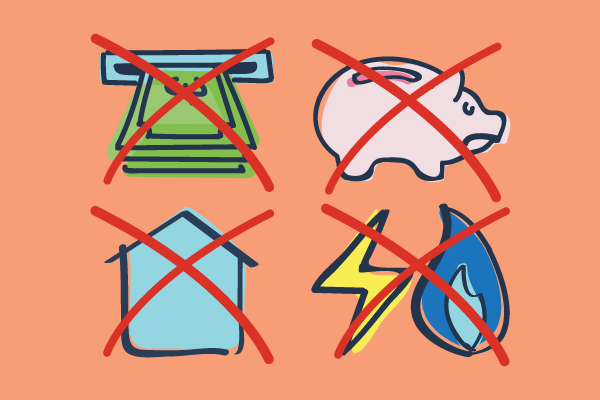Lasting Power of Attorney, I don’t need that yet? Do I?
A common mistake is to think Lasting Power of Attorney (LPA) is just something for the elderly.
This is wrong.
Really anyone over the age of 18 (I know a few of you must be 😊) with financial assets should have one.
You may have seen TV host Kate Garraway in the news recently encouraging people to put an LPA in place because of her family’s own dreadful experience.
When Kate’s husband Derek was incapacitated due to a yearlong battle with COVID, due to him not having a Lasting Power of Attorney in place, she couldn’t access his bank accounts or their joint savings.
This had a devastating effect on Kate and her children.
Kate said power of attorney had been on her radar. “Derek said [at some point in the past] we have to appoint power of attorney in case anything happens,” she said. “He said I’d be his. And I’m sure I made some kind of joke, saying, ‘Well, you’re not being mine’… So I know we’ve had that conversation. But it isn’t logged anywhere. Or if it is, I can’t find it.”
In a time of such emotional agony, their financial situation made things even tougher.
Because no Lasting Power of Attorney was in place, Kate had to endure lengthy, complex, and costly court proceedings to try and gain the power to look after her family affairs.
This is why Kate is campaigning so passionately to raise awareness of the importance of LPAs, to hopefully help as many people avoid the same awful situation.
What happens when I lose capacity?
Legally, to make decisions about your money and property you must have mental and physical capacity.
People can lose capacity, often due to a medical event, and incapacity can continue for long periods.
Unfortunately, many associate incapacity with a slow degenerative condition, such as dementia, which may allow plenty of time to arrange any legal documents before capacity is fully lost.
However, whilst dementia is a common cause of incapacity, there are many other ways capacity can be lost without warning, such as a stroke, heart attack or trauma injury.
When you lose capacity all assets you hold in your own name become frozen.
This means no transactions can be carried out on anything, including bank accounts, property, savings, or pensions.
This also includes everyday accounts, which cannot be changed or stopped, such as gas, water, electricity, broadband, gym membership, etc. This is because only you have authority to operate your accounts and you have lost the capacity to do so.

Your partner and dependents could be faced with problems such as:
- Not being able to access any money held in accounts, savings, or pensions in your name
- Not being able to access any joint bank accounts they hold with you
- Not being able to give instructions to utility companies where you are the account holder
- Not being able to sell any property you own jointly, even where the intention is for your benefit, such as assisted living
- Perhaps the most unpleasant surprise for people who find themselves in this situation is that assets you hold jointly also become frozen. This includes joint bank accounts and jointly owned property.
This can often cause undue financial hardship and distress at a time when they’re trying to cope with a life changing event.
To obtain authority to handle the affairs of someone who becomes incapacitated without Lasting Power of Attorney, an application to the Court of Protection is required.
This is a difficult process and you’ll be required to pay for medical reports, solicitors, barristers, and court fees. Typical timescales for the process can be close to a year and application costs are around £1,000, with additional ongoing fees due to the court.
So, what actually is Lasting Power of Attorney?
A Lasting Power of Attorney is a legal document that grants powers to people you trust, known as your Attorneys, and allows them to make decisions for you when you’re no longer able. There are two types of LPAs:
Financial and Property– This allows for your attorneys to make and implement decisions concerning your financial affairs and buy and sell property on your behalf.
Health and Welfare – This allows your attorneys to make medical and care decisions on your behalf
Rules have been set in place to stop an attorney from benefiting, they must act in your best interest.
Why should I register a Lasting Power of Attorney immediately?
You may if you wish, draft, and sign your Lasting Power of Attorney but delay the registration costs until such time as you lose capacity. The only benefit of this is kicking the cost down the road, but there are several disadvantages:
- If you register it at the point that incapacity is lost there is a minimum 12 weeks wait for the registration, during which time you will not have the legal powers provided by the Lasting Power of Attorney. Those first three months are likely to be the most critical for making decisions.
- If there’s an error in your document when you come to register, it will fail registration and become invalid. Because you will, at that point, be incapacitated, you won’t be able to correct the errors and register it successfully.
Who can I talk to about putting Lasting Power of Attorney in place?
Our dedicated Protect team are here to help you with all aspects of estate planning, including LPAs, will writing, Trusts to help protect against care fees, and more.
Call, use the form below, or pop in for a cuppa and we’ll see how we can help.
Without Lasting Power of Attorney your partner and dependents could be faced with problems such as:
- Not being able to access any money held in accounts, savings, or pensions in your name
- Not being able to access any joint bank accounts they hold with you
- Not being able to give instructions to utility companies where you are the account holder
- Not being able to sell any property you own jointly, even where the intention is for your benefit, such as assisted living
- Perhaps the most unpleasant surprise for people who find themselves in this situation is that assets you hold jointly also become frozen. This includes joint bank accounts and jointly owned property.
This can often cause undue financial hardship and distress at a time when they’re trying to cope with a life changing event.
Who can I talk to about putting Lasting Power of Attorney in place?
Our dedicated Protect team are here to help you with all aspects of estate planning, including LPAs, will writing, Trusts to help protect against care fees, and more.
Click the button below to arrange your call.
Sharing’s Caring – Refer a Friend Scheme
Do you know someone who could also benefit from our help and advice?
If we think we can help, we’ll offer them a free consultation and send you a little something to say thank you 🎁
Click the button below to find out more…
"I cannot find fault with the service we received. From the warm yet professional welcome to the financial advice we were given. You as a company should be proud of the service you are providing" Mr. WTalk To The Experts
Ready to talk? Our friendly team are here to help. Simply pop a few details into the form and we'll be in touch.
We'll show you:
When you can afford to retire
How much money you'll need in retirement
How to make the most of your pensions and other assets to fund your lifestyle
4.9 out of 5 stars on VouchedFor



